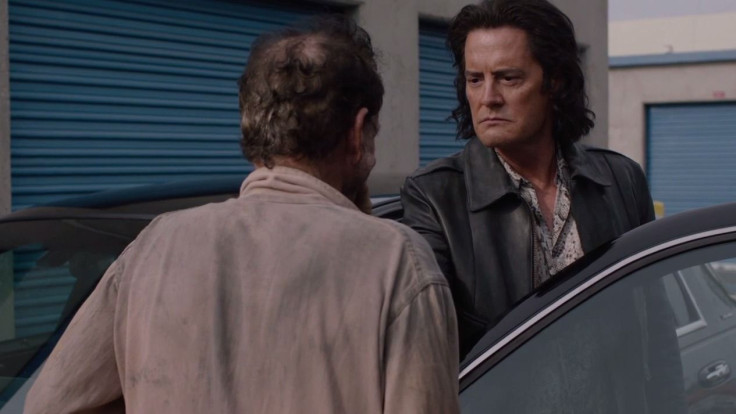The first two episodes of Twin Peaks: The Return premiered Sunday on Showtime. But while the new series’ episodes, set 25 years after the end of the original Twin Peaks, reintroduced us to a significant swath of the original cast, there was precious little time spent in the titular town. In recapturing Twin Peaks’ signature balance of small-town melodrama and cosmic mystery, The Return has skewed the balance toward the latter. In this, Twin Peaks: The Return feels most like the David Lynch written and directed series finale, or his follow-up prequel movie, Twin Peaks: Fire Walk With Me.
Still, despite the talking tree “arm,” the doppelgangers and that empty box (a subplot better than most horror movies, perfect proof of Lynch’s vast talent and vision), the new Twin Peaks, like the old, has everyday people and their dramas as its focus. For every visionary freakout in the Black Lodge, Twin Peaks: The Return has ten minutes of cops and oddballs trying to secure a house key. Better than almost anything on TV, Twin Peaks understands just how silly we all are, flying in the face of our overwhelming cultural adoration for the ruthless, the powerful, the certain, the genius and the efficient. It’s not competence and expertise that define us as a species, but incompetence and fumbling and failing to uphold the standards of our own ideals and institutions.
Most of our favorite shows star characters with nearly supernatural capacities. Game of Thrones exclusively follows the remarkable — queens who rule with the backing of destiny, the best sword fighters on two continents and magical kids who just happen to be the sons and daughters of (formerly) powerful lords. Some of our favorite protagonists are sociopaths or near-sociopaths who can manipulate the people and world around them. We love Hannibal Lecter, Rick Sanchez, Dexter Morgan, Sherlock Holmes, Marlo Stanfield and Frank Underwood because it’s empowering to imagine having so much control over a chaotic world. But this can get tiring too. Later episodes of Westworld felt like character after character telling us “a ha! but you see… that was my plan all along!”
But the first two episodes of Twin Peaks: The Return follows baffled police who mostly stand around, a school principal who seems emotionally incapable of the murder he’s accused of committing, a kid with a part-time job watching an empty box, the rich but frivolous Horne brothers and a variety of weirdos, paranoiacs, layabouts and incompetent criminals.
Rather than following forceful people bending the world to their whims, the new Twin Peaks presents to us normal people caught up in mysteries both mundane and paranormal, hanging as best they can in the face of life’s chaos. A man in a parking lot obsesses over the contents of a satchel, dodging the cops as if he’s the object of their pursuit, rather than just an incidental character living near murder scene. He’s the protagonist of his story, no remarkable talents required. For him, Twin Peaks is about him.
Only BOB seems to have any control of the situation. In the premiere of the new Twin Peaks , we are reintroduced to Dale Cooper (Kyle MacLachlan) — or more appropriately his doppelganger — roaring around the desert with a cadre of disposable criminals, his body still possessed by the cosmic evil from the Black Lodge. BOB is looking for a way to stay in our world, keeping the soul of Agent Cooper trapped in his. But while BOB’s brutality is efficient against his sleazy hanger-ons, Twin Peaks doesn’t honor or admire his cleverness. It’s not about him masterminding an expertly tuned plot. There’s even indications that the supernatural beings of Twin Peaks are just as muddling and incompetent as we are.
At the end of the second episode, Cooper, always Twin Peaks’ center of competence and capability, attempts to escape the Black Lodge with the help of The One-Armed Man and The Man From Another Place (who together form a cosmic entity, MIKE, opposed to BOB, even if they too feed on the “Garmonbozia” of human pain and sorrow). It doesn’t go so well. Partially because MIKE seems confused on whether or not it's the past or future, muddling the moment for action. But also because they didn’t count on the treachery of The Man From Another Place’s doppelganger attacking. Whereas the Black Lodge seemed like a place that didn’t make sense to us, but made sense to Twin Peaks ’ supernatural beings, Twin Peaks: The Return suggests an extradimensional space that is as confusing for its residents as Earth can be for us.
Even Dale Cooper, a paragon of virtue since the very first episode of Twin Peaks, accomplishes the most when he relinquishes control, placing faith in something other than his own rationality and capabilities as an FBI agent. He listens to dreams and to signals from nature to proceed, rather than reshaping the world in his self-image. And while this Twin Peaks is very different from that Twin Peaks (no donuts and no pie… yet), it similarly revels in the power of letting go and the honest admissions of human limitations. There are no superhumans thinking five steps ahead in Twin Peaks (can we all just agree to forget about Windom Earle?).
While we still have no clue where the remainder of Twin Peaks Season 3 will take us, Lynch will never turn to normal prestige TV plotting. Our desire to assemble the grand design in our head — Westworld syndrome — will only fail us when applied to Twin Peaks. Because, unlike too much TV, Twin Peaks isn’t about how clever its writers and viewers can make each moment, but about the strange, cosmic journey we’re on, bumbling forward through confusing lives as events we’ll never fully comprehend go on all around us.


















